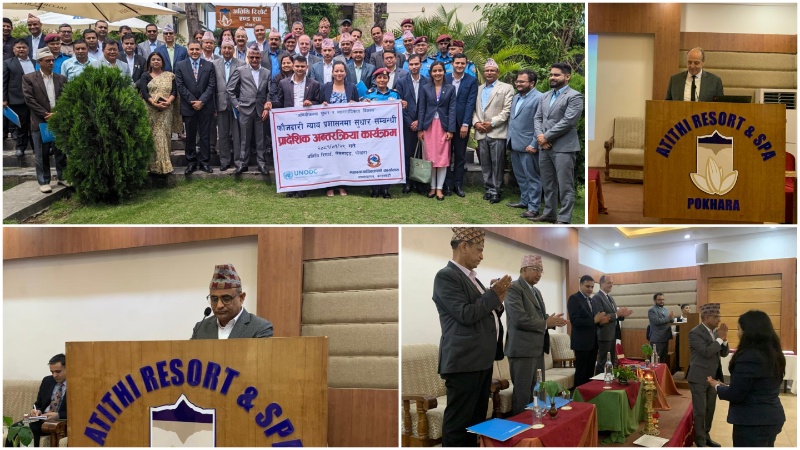Nepal: UNODC unites provincial stakeholders to strengthen criminal justice mechanisms

Kathmandu, Nepal/11 May 2024: Criminal justice reform stands at the forefront of societal progress, representing a critical avenue to enhance access to justice and safeguard fundamental rights. Strong and accountable criminal justice mechanisms are at the centre of the protection of individual liberties and the preservation of social harmony. In this respect, equipping law enforcement officials, prosecutors, and judicial personnel with the requisite knowledge and skills to navigate complex legal landscapes with precision and integrity is key.
Building on this, in collaboration with the Office of the Attorney General, a high-level provincial consultation was held in Pokhara, to identify legal and policy challenges with regard to access to justice for victims of sexual violence, polygamy, trafficking in persons, drugs and crime.
Inaugurated by Attorney General Dr. Dina Mani Pokharel, the training featured enlightening sessions by Deputy Attorney General Mr. Sanjeeb Raj Regmi and Joint Government Attorney Mr. Som Kanta Bhandari focusing on key areas within the criminal justice system. Their insights shed light on the gaps and challenges embedded within existing laws and procedures, emphasizing the urgency for amendments to ensure equitable access to justice for all individuals, especially victims of gender-based violence (GBV).
The consultation was attended by senior judges, police officials and prosecutors, who collectively formulated a comprehensive set of recommendations aimed at revitalizing the criminal justice landscape. Their interventions highlighted the need to review and revise legislation pertaining to rape, human trafficking, and drug-related offenses. Emphasizing the importance of evidence-based approaches, stakeholders called for modern investigative techniques to bolster prosecution efforts and ensure the swift delivery of justice.
Participants also advocated capacity building of prosecutors with the tools necessary to navigate complex legal terrain, the implementation of plea bargaining and diversion mechanisms to safeguard the interests of vulnerable groups, particularly children. Discussions also focused on the necessity of clarifying laws pertaining to sexual offenses against LGBTI+ individuals, advocating for uniformity and inclusivity within the justice system.
The consultation acted as a catalyst for action, galvanizing criminal justice actors to redouble their commitment towards effecting tangible change. By amplifying the voices of those on the frontlines of justice delivery, the event underscored the collective resolve to combat impunity and uphold the rule of law.
The activity contributed to SDG 5, SDG 16 and SDG 17: https://sdg-tracker.org/
(Supported by Government of Norway)